
Recognizing Silent Heart Attack Signs in Winter: What You Need to Know
By Dr. Shalini Garg in Cardiology Interventional Cardiology
Dec 20, 2024
As winter descends with its chilly temperatures and shorter days, many people may overlook the subtle signs of a heart attack, particularly a silent heart attack. Unlike typical heart attacks that present with clear and intense symptoms, silent heart attacks often go unnoticed, especially during the colder months when other health issues may mask the warning signs. Understanding these signs and knowing how to respond can be crucial for your heart health.
What is a Silent Heart Attack?
A silent heart attack, or myocardial infarction, occurs when blood flow to the heart is blocked, causing damage to the heart muscle without the classic symptoms of chest pain or pressure. This type of heart attack can happen without the person being aware that it has occurred, making it particularly dangerous. Silent heart attacks can lead to significant heart damage and increase the risk of future heart events.
Why Winter Increases the Risk
Winter can exacerbate the risk factors associated with heart attacks:
- Cold Weather Effects: Cold temperatures can cause blood vessels to constrict, leading to higher blood pressure & increased heart rate. This additional strain can provoke a heart attack, particularly in individuals with pre-existing heart conditions.
- Lifestyle Changes: Many people become less active during winter, opting for indoor activities. This sedentary lifestyle can contribute to weight gain & higher cholesterol levels.
- Seasonal Stress and Depression: The winter months can bring feelings of isolation and sadness, particularly for those suffering from seasonal affective disorder (SAD). Stress & depression are recognized as significant risk factors for heart disease.
Silent Heart Attack Signs to Watch For
Recognizing the signs of a silent heart attack is crucial. Here are some symptoms that might not be immediately linked to a heart attack:
- Unexplained Fatigue: A sudden and unusual feeling of fatigue or weakness can be a precursor to a heart attack. This fatigue may feel different from typical tiredness and can last for days.
- Shortness of Breath: If you experience difficulty breathing or shortness of breath, even when resting or doing minimal exertion, it could indicate a heart problem.
- Discomfort in the Chest: While chest pain is often associated with heart attacks, silent heart attacks may present as mild discomfort or a feeling of fullness. This sensation can be easily dismissed or mistaken for indigestion.
- Pain in Other Areas: Silent heart attacks can manifest as pain or discomfort in the arms, back, neck, jaw, or stomach. If you experience unexplained discomfort in these areas, especially if accompanied by other symptoms, seek medical advice.
- Nausea or Lightheadedness: Feelings of nausea, dizziness, or lightheadedness can occur during a silent heart attack. These symptoms may be mistaken for other conditions, but they should not be ignored.
- Cold Sweats: Unexplained sweating, especially if you are otherwise not hot or exerting yourself, can be a sign of heart distress.
What to do if you suspect you’re having a silent heart attack.
If you or someone else experiences any combination of these symptoms, it is crucial to seek medical attention immediately. Even if symptoms seem mild, they can indicate a serious underlying issue. Early detection & treatment can significantly improve outcomes & reduce the risk of further heart complications.
Preventive Measures
To reduce the risk of silent heart attacks, consider the following preventive measures:
- Stay Active: Engage in regular physical activity, even indoors during winter months.
- Maintain a Healthy Diet: Focus on a balanced diet rich in fruits, vegetables, whole grains & lean proteins. Reduce your intake of processed foods that are high in sugar and unhealthy fats.
- Manage stress by practicing relaxation techniques like meditation, yoga, or deep breathing exercises to help reduce stress levels.
- Regular Check-Ups: Schedule regular check-ups with your healthcare provider to monitor heart health and address any risk factors.







